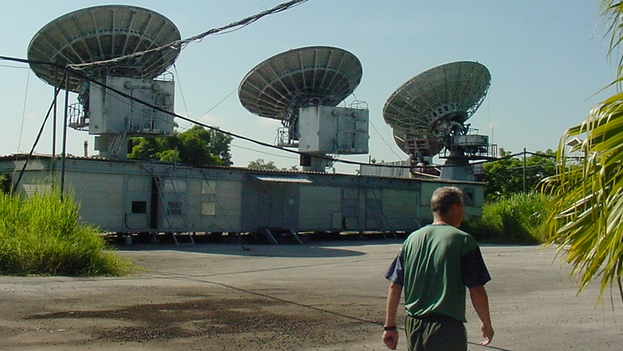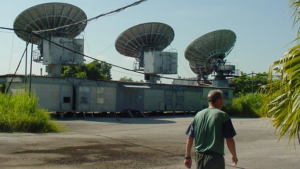CHINA Y CUBA LLEGAN A UN ACUERDO FINANCIERO PARA BASE DE ESPIONAJE ELECTRONICO EN LA ISLA. PHOTOS

El Centro de Exploración y Escucha Radioelectrónica, conocido como “Base Lourdes”, de la Universidad de Ciencias Informáticas de La Habana. (UCI)
La instalación puede dar acceso a las muchas bases militares situadas en el sur de EE UU, afirma ‘The Wall Street Journal’. China y Cuba acuerdan “una relación estratégica de larga duración” en ciberseguridad.
CHINA Y CUBA han alcanzado un acuerdo secreto para que Pekín instale una infraestructura de espionaje electrónico en la Isla destinada a captar comunicaciones de todo el sur de EE UU, según han revelado funcionarios de Washington en exclusiva al diario económico The Wall Street Journal. El medio afirma que la instalación puede dar acceso a las muchas bases militares que se encuentran en esa zona y monitorear el tráfico marítimo de EE UU.
“Aunque no puedo hablar sobre este informe específico, somos muy conscientes de los esfuerzos de China para invertir en infraestructura con fines militares en todo el mundo, incluso en este hemisferio, y hemos hablado muchas veces sobre ello”, dijo al WSJ el portavoz del Consejo de Seguridad Nacional, John Kirby.
El funcionario añadió que Washington da seguimiento a esta situación y tiene medidas para contrarrestarla. “Confiamos en que podemos cumplir con todos nuestros compromisos de seguridad dentro de la nación, en la región y en todo el mundo”.
De acuerdo con las fuentes del medio, funcionarios de inteligencia “altamente clasificada”, China ha ofrecido a Cuba miles de millones de dólares a cambio de la autorización para construir la base de espionaje y el régimen de La Habana, muy necesitado de fondos, habría accedido. La proximidad de esta ubicación constituye una señal de alarma para Washington, y el diario no duda en calificar la situación de “amenaza sin precedentes”, aunque recuerda la base de Lourdes instalada en la Isla por la URSS el siglo pasado y desmantelada en 2001.
Los funcionarios afirman tener información –aunque se negaron a revelarla– sobre la ubicación de la base, que permitiría a China realizar una técnica de inteligencia conocida como ‘sigint’. Los funcionarios afirman tener información –aunque se negaron a revelarla– sobre la ubicación de la base, que permitiría a China realizar una técnica de inteligencia conocida como sigint (signal intelligence), que consiste en la recolección de información sobre un objetivo, tanto para labores de defensa como de ataque, que incluyen la supervisión de las comunicaciones, incluidos correos electrónicos, llamadas telefónicas y transmisiones satelitales.
Por su parte, las embajadas de los países implicados evitaron hacer comentarios e, incluso, la de Cuba no respondió a la solicitud.
ANALISTAS CONSULTADOS
El diario The Wall Street Journal (WSJ) asegura que sus fuentes tampoco quisieron aclarar si la construcción ha empezado o es apenas un plan, a la vez que admite que es complicado que EE UU pueda intervenir para detener la construcción. Para ello, recuerda la crisis de los misiles de 1962 y cómo el país acabó retirando de Turquía, sigilosamente, los balísticos de alcance intermedio que molestaban a Moscú para cerrar la crisis, y después de que los rusos sacaran de Cuba los propios.
“Es probable que Pekín argumente que la base en Cuba está justificada, debido a las actividades militares y de inteligencia de Estados Unidos cercanas a China”, comentaron al diario estadounidense varios analistas consultados. El periódico recuerda que hay aviones militares de EE UU que realizan vigilancia electrónica sobre el Mar de China y que Washington vende armas a Taiwán, donde también tiene tropas desplegadas y navega barcos de su armada.
El secretario de Estado, Antony Blinken, tiene previsto un viaje a Pekín a finales de mes y es posible que se encuentre con el presidente chino, Xi Jinping. Ambas potencias tratan de cerrar la crisis vivida hace unos meses, cuando un globo chino sobrevoló Estados Unidos y fue derribado sobre aguas del Atlántico. Pekín admitió entonces que el globo le pertenecía, pero alegó que se había extraviado y que se usaba para fines meteorológicos, no para espionaje.
(ACTUALIZADO). La Casa Blanca rechazó el reporte del diario The Wall Street Journal según el cual Pekín llegó a un acuerdo con el régimen de Cuba para establecer una base de espionaje en la Isla que apuntaría a las comunicaciones militares de Estados Unidos.
“He visto ese informe de prensa. Es inexacto”, aseguró el portavoz del Consejo de Seguridad Nacional de la Casa Blanca, John Kirby, en una entrevista en MSNBC.
Por su parte la Cancillería cubana negó este jueves la información del diario estadounidense The Wall Street Journal que afirma que el Gobierno de la Isla firmó un acuerdo con China para permitir la instalación en su territorio de un gran centro secreto de espionaje.
El viceministro de Relaciones Exteriores, Carlos Fernández de Cossío, aseguró en una declaración a los medios que se trata de “informaciones infundadas”, “calumnias” y “falacias” para justificar las sanciones de Estados Unidos contra Cuba y desestabilizar la Isla.
Agregó que el Gobierno cubano rechaza “toda presencia militar” en América Latina y el Caribe, incluida la estadounidense en Guantánamo.
CHINA AND CUBA REACH A FINANCIAL AGREEMENT FOR AN ELECTRONIC ESPIONAGE BASE ON THE ISLAND. PHOTOS
The installation can give access to the many military bases located in the south of the US, says ‘The Wall Street Journal’. China and Cuba agree to “a long-term strategic relationship” on cybersecurity.
CHINA AND CUBA have reached a secret agreement for Beijing to install an electronic espionage infrastructure on the island aimed at capturing communications from the entire southern United States, according to what Washington officials have revealed exclusively to The Wall Street Journal. The outlet claims that the facility can provide access to the many military bases in that area and monitor US maritime traffic.
“Although I cannot speak about this specific report, we are very aware of China’s efforts to invest in infrastructure for military purposes around the world, including in this hemisphere, and we have spoken about it many times,” the spokesperson for the National Security Council, John Kirby.
The official added that Washington is monitoring this situation and has measures to counteract it. “We are confident that we can meet all of our security commitments within the nation, in the region and around the world.”
According to media sources, “highly classified” intelligence officials, China has offered Cuba billions of dollars in exchange for authorization to build the spy base and the Havana regime, badly in need of funds, would have accessed. The proximity of this location constitutes an alarm signal for Washington, and the newspaper does not hesitate to describe the situation as an “unprecedented threat”, although it recalls the Lourdes base installed on the island by the USSR last century and dismantled in 2001.
The officials claim to have information – although they refused to disclose it – about the location of the base, which would allow China to carry out an intelligence technique known as ‘sigint’. The officials claim to have information – although they refused to disclose it – about the location of the base, which would allow China to carry out an intelligence technique known as sigint (signal intelligence), which consists of collecting information about a target, both for tasks defense and attack, including monitoring of communications, including emails, phone calls, and satellite transmissions.
For their part, the embassies of the countries involved avoided making comments and even that of Cuba did not respond to the request.
CONSULTED ANALYST
The newspaper The Wall Street Journal (WSJ) assures that its sources did not want to clarify whether the construction has begun or is just a plan, while admitting that it is difficult for the US to intervene to stop the construction. To do this, he recalls the missile crisis of 1962 and how the country ended up stealthily withdrawing from Turkey the intermediate-range ballistics that bothered Moscow to end the crisis, and after the Russians took their own from Cuba.
“Beijing is likely to argue that the base in Cuba is justified, due to the US military and intelligence activities close to China,” several analysts consulted told the US newspaper. The newspaper recalls that there are US military planes that carry out electronic surveillance over the China Sea and that Washington sells arms to Taiwan, where it also has troops deployed and sails its navy ships.
Secretary of State Antony Blinken is planning a trip to Beijing later this month and he may meet Chinese President Xi Jinping. Both powers are trying to end the crisis experienced a few months ago, when a Chinese balloon flew over the United States and was shot down over Atlantic waters. Beijing then admitted that the balloon belonged to it, but claimed that it had been lost and that it was used for meteorological purposes, not espionage.
(UPDATED). The White House rejected the report by The Wall Street Journal according to which Beijing reached an agreement with the Cuban regime to establish a spy base on the island that would target US military communications.
“I’ve seen that press report. It’s inaccurate,” White House National Security Council spokesman John Kirby said in an interview on MSNBC.
For its part, the Cuban Foreign Ministry denied this Thursday the information from the US newspaper The Wall Street Journal that the Island’s government signed an agreement with China to allow the installation of a large secret spy center on its territory.
The Vice Minister of Foreign Affairs, Carlos Fernández de Cossío, assured in a statement to the media that it is “unfounded information”, “slander” and “fallacies” to justify the United States sanctions against Cuba and destabilize the Island.
He added that the Cuban government rejects “all military presence” in Latin America and the Caribbean, including the US in Guantanamo.
Agencies/ TheWallStreetJournal (WSJ)/ 14yMedio/ Extractos/ Excerpts/ Internet Photos/ Arnoldo Varona/ wwww.TheCubanHistory.com
THE CUBAN HISTORY, HOLLYWOOD.









